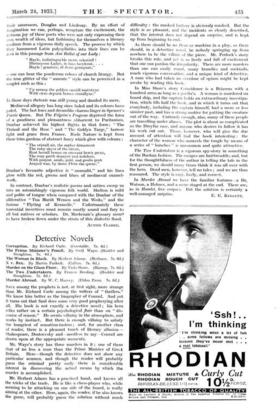Detective Novels
Corruption. By Richard Curie. (Constable. 7s. 6d.) Murder Abroad. By W. C. Harvey. (Eldon Press. 7s. 6d.) SAUL among the prophets is not, at first sight, more strange than Mr. Richard Curie among the wilters of "thrillers." We know him better as the biographer of Conrad. And yet it turns out that Saul does some very good prophesying after all. His book is not exactly a detective novel ; his hero relies rather on a certain psychological flair than on "dis- course of reason." He scents villainy in the atmosphere, and works by instinct. But there is enough villainy to satisfy the hungriest of sensation-tasters ; and, for another class of reader, there is a pleasant touch of literary allusion— Shakespeare, Dostoevsky and—needless to say—Conrad are drawn upon at the appropriate moments.
Mr. Waye's story has three murders in it ; one of them that of no less a man than the Prime Minister of Grect Britain. Here—though the detective does not show any particular acumen, and though the reader will probably guess the criminal pretty early —there is considerable interest in discovering the actual means by which the murder is accomplished.
Mr. Herbert Adams has a practised hand, and knows all the tricks of the trade. He is like a chess-player who, while seeming to be attacking on one side of the board, is really aiming at the other. Here, again, the reader, if he also knows the game, will probably guess the solution without much
difficulty : the masked battery is obviously masked. But the style .is so pleasant, and the incidents so clearly described, that the. interest does not depend on surprise, and is kept up from beginning to end.
As there should be no Deus ex machine in a play, so there should, in a detective novel, be nobody springing up from nowhere to be the villain of the piece. Mr. Porlock's story breaks this rule, and yet is so lively and full of excitement that one can pardon the irregularity. There are more murders than one can easily count, many brandies and cocktails, much vigorous conversation, and a unique kind of detective. A man who had taken an overdose of opium might be kept awake by reading this book.
In Miss Shore's story Coincidence is a Briareus with a hundred arms as long as a gorilla's. A woman is murdered on hoard ship, and the captain holds an extraordinary investiga- tion, which fills half the hook, and in which it turns out that everybody, including the captain himself, had a more or less sinister past, and has a strong motive for putting the creature out of the way. Curiously enough, also, many of these people are travelling under aliases. The plot is about as complicated as the Dreyfus case, and anyone who desires to follow it has his work cut out. Those, however, who will give the due amount of attention will find the book interesting : the character of the woman who unravels the tangle by means of a series of " hunches " is uncommon and quite attractive.
The Two Undertakers is a vigorous spy-story in something of the Buchan fashion. The escapes are hairbreadth ; and, but for the thoughtfulness of the author in telling the tale in the first person, we should many times think it was all over with the hero. Dead men, however, tell no tales ; and we are thus reassured. The style is easy, lively, and correct.
In Murder Abroad we have the familiar features—a Dr, Watson, a Holmes, and a scene staged at the end. There are, as in Hamlet, five corpses. But the solution is certainly is
well-managed surprise.
E. E. KELLETT.






































 Previous page
Previous page